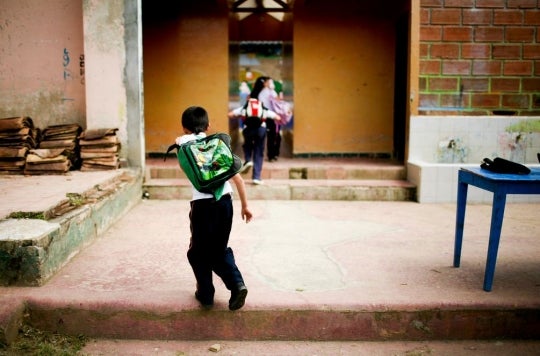
How did a new training college in Jamaica win a Caribbean-wide award that recognizes the best innovations for solving complex problems?
Jamaica’s National College for Education Leadership (NCEL) was just established in 2011 but it has already bagged a Bright Spot Award in innovations by the Canadian Department of Foreign Affairs, Trade and Development.
NCEL’s Effective Principals' Training Program, supported by the World Bank Group (WBG), emphasizes current and applicable practice over theory. Under the program, nearly 600 Jamaican school leaders have received training on modules such as financial management, school planning, data management, networking, and more.
We spoke to Harriet Nannyonjo, our senior education specialist working on several countries in Latin America and the Caribbean, about the award-winning training program and what other developing countries can learn from it.
Q: Please tell us about your work with the NCEL. What did you feel when it won an award?
I’m an advocate of good school leadership, I have done research on this subject and it has always been a component in several other education projects that I’ve worked on before. I currently lead the team that supports the NCEL in Jamaica.
I was happy but not very surprised when it won the award. I’ve met the school principals who’ve been through the training and they talk about how their schools are improving. Several, in fact, who have not completed the modules are looking forward to applying what they’ve learned.
Q: Can you share the experiences of Jamaican school leaders and educators who have gone through the school leadership program?
Certainly. One of the school principals who had gone through the program said that he was not aware of many of his responsibilities. The principal said that the training clarified these responsibilities and equipped him with the skills and knowledge to handle them well. He was able to support teachers in becoming better educators and helping students learn.
Q: Tell us about the WBG’s support for school leadership in Jamaica. What can countries with similar programs learn from its success?
Instead of focusing only on theories, Jamaica’s NCEL training is competency-based. It focuses on actions and behaviors in key areas that research has demonstrated are likely to improve school effectiveness. These include school planning and data management, supervision of teaching, effective classroom observation, organizing the school leadership team, defining the roles and responsibilities of the principal, and financial management, among others.
After the training, principals are expected to demonstrate the new skills and practices they acquired. They are then certified.
The results have been remarkable! Many program graduates lead schools that have seen improved student achievement in the years following the training. Their engagement with communities and teachers is stronger and they are working together to address challenges facing the school.
Q: The NCEL seems to be producing a lot of school leaders who are achieving good results. What can other school leaders from around the world learn from this?
Effective school leaders motivate staff. They connect the school with the wider community by creating partnerships with other schools, parents, communities, local businesses, and community organizations. They also support and engage teachers and policy makers to ensure that the success of every learner is at the center of all their actions, and set clear and measurable goals regarding achievement of individual students.
Q: Shouldn’t the focus be more directly on students?
Research points to a strong causal relationship between talented school leadership and student achievement. This is why many education systems worldwide are increasingly paying attention to school leadership.
Q: How is the WBG supporting school leadership around the world?
In many developing countries, limited resources are channeled into training school leaders. We are trying to help countries fill this gap by collating and sharing global knowledge on school leadership and by providing resources to countries. In Jamaica, for example, we are supporting the Education System Transformation Program through a $16 million loan and have provided a $50,000 grant to NCEL.
Follow the World Bank Group Education team on Twitter @wbg_education


Join the Conversation